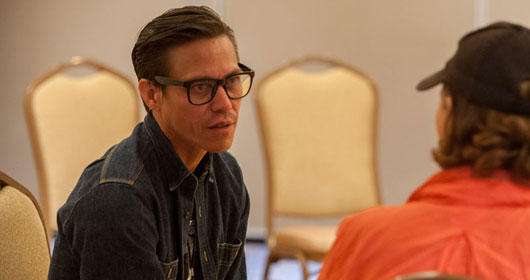Christopher Kahunahana attends the Native Lab © 2014 Sundance Institute | Photo by Rich Chavez
Nate von Zumwalt
Last week, the Sundance Institute Native American and Indigenous Program kicked off its annual fellowship with a four-day workshop on the homelands of the Mescalero Apache Tribe in New Mexico. On the heels of his rigorous week at the Native Lab, Native Hawaiian filmmaker Christopher Kahunahana opened up about his creative impulses and how he’s arrived at his current project, Karaoke Kings, a singular story oriented around the homeless community in Honolulu’s Chinatown.
Can you offer a brief description of your project and your personal connection to—or why you’re compelled to tell—this story?
During the past 10 years that I’ve worked in Chinatown I’ve seen the homeless population grow immensely. I’ve got to know a few of them whose stories are devastatingly sad, yet ironically they are almost always hopeful that tomorrow will be better, that things will change. Unfortunately, that has never been the case. In Karaoke Kings, I fantasize that they find redemption and love.
What are the origins of your interest in filmmaking?
As long as I can remember, I’ve been an artist. But the thing that really created my love for film was the moments late at night when my Mom would stay up late to watch VHS tapes of HBO shows she had her sister record for her. Safe under her arm on the couch, watching movies ‘til sunrise was our little secret.
How has your Native heritage influenced or ignited your desire to tell stories through film?
For Hawaiians, telling stories is how we share and learn about the world around us. Working in the tourist industry I’ve seen how Hawaii has been packaged and sold as a paradise. Growing up I’ve learned about the effects that colonization and social injustice has had on Native peoples and Hawaiians specifically.
I realized that we were only being told half the story. As modern society destroys the planet and people are starting to realize that the native ideas of connection to the land and sustainability have some merit, I feel as a filmmaker it is my responsibility to share our stories. If not I, who will?
Is there a film or director that you identify as having spurred your interest in film?
The first films that showed me that films were art and not just entertainment were the spaghetti westerns of Sergio Leone. The first film that showed me that films can influence thought was Baraka. The first film that showed me that film can be used to tell stories to bring social change with style and substance was Soy Cuba.




